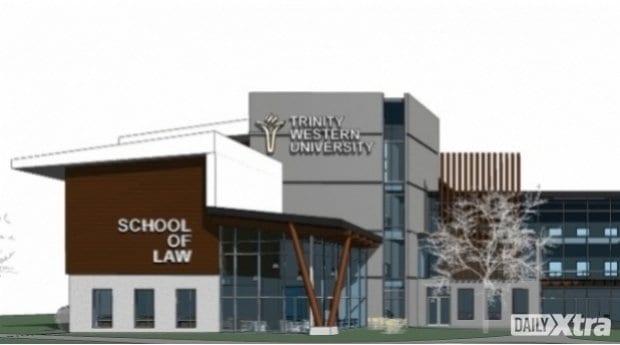New Brunswick lawyers on Sept 13 voted 137 to 30 to overturn their law society’s earlier approval of Trinity Western University’s (TWU) proposed law school.
New Brunswick’s law society had approved the Christian university’s proposal on June 27 in a 14 to five vote, following the lead of Canada’s Federation of Law Societies.
But the federation examined only whether the proposed law school’s graduates could meet national professional requirements for knowledge and competencies needed for entry to the bar admission programs in the Canadian common-law jurisdictions. It didn’t rule on the school’s covenant.
For admission to TWU, students must sign a covenant agreeing to uphold Christian biblical teachings, including no premarital sex and no homosexuality. Failure to uphold these commitments, according to the student handbook, could result in discipline, dismissal or a refusal to readmit a student to the university.
The New Brunswick society was forced to hold a special general meeting (SGM) in Fredericton after more than 200 lawyers signed a petition asking the decision be reconsidered. Only 20 signatures were needed to force the SGM.
Society president Hélène L Beaulieu says the non-binding vote results will be taken to the next council meeting on Sept 26 for discussion. If the council adopts the SGM vote, TWU law school students would be ineligible to practise law in New Brunswick.
“Council will continue with a fair and open process and discussion of the implications of this resolution,” Beaulieu says. “Council values the opinion of all the membership. I am confident that council will work its way through this difficult and controversial issue with openness and transparency.”
TWU spokesperson Guy Saffold says the result is surprising. “As a private Christian-based university, Trinity Western is open and welcoming to all,” he says. “The resolution does not reflect Canada’s historic commitments of respect for diverse groups.
“It is disappointing that a resolution would pass that would compromise Canada’s commitment to freedoms of conscience, religion, belief, expression and association,” he adds.
TWU School of Law executive director Earl Phillips says decisions involving fundamental rights and freedoms should not be decided by popular vote.
He says New Brunswick’s law society approved the school after considering many submissions, including the 2001 Supreme Court of Canada decision that upheld TWU’s right to teach Christian values to would-be teachers and to insist that incoming students sign the covenant.
Ted Flett, a member of OUTLaw, the LGBT student group at the University of New Brunswick’s law school, tells Xtra he’s “thrilled” with the SGM results.
He says the SGM shows that the law society’s council and the Canadian law federation are out of step with the membership on this issue. “I had goose bumps throughout the meeting,” he says.
“I am cautiously optimistic that the council will change its position,” he continues, acknowledging that the SGM vote is not binding and a revote would require a shift in position of at least five council members. “That may be a little ambitious.”
Students were not permitted to vote at the SGM, but Flett says a letter of endorsement for the motion with 56 signatures of law and articling students has been submitted to the council.
The New Brunswick law society is not the first to face members’ discontent with its decision to approve the TWU school. Members of BC’s law society also held an SGM in June after thousands of lawyers demanded a reconsideration of their council’s decision.
BC members passed a resolution by a vote of 3,210 to 968 directing the society’s board of directors to declare that the proposed law school at Trinity Western University is not an approved faculty of law.
The BC law society will consider its SGM results on Sept 26 in Vancouver.
Elsewhere in Canada, Alberta and Saskatchewan have decided to accept TWU graduates, while Ontario and Nova Scotia refused.
TWU is suing Ontario and Nova Scotia for their refusals, while a gay plaintiff in BC is suing the provincial government for its approval of TWU, saying the proposed school will discriminate against people based on sexual orientation and religious grounds.
“Any move to marginalize the millions of Canadian citizens of diverse faiths who share a common understanding of marriage suggests development of a very dangerous trend,” Saffold says. “A just society protects the rights of all religions.”
Notwithstanding the lawsuits in BC, Ontario and Nova Scotia, TWU has all the necessary approvals and will continue with its plans to launch Canada’s first law school at a faith-based university in September 2016, the university says.

 Why you can trust Xtra
Why you can trust Xtra


